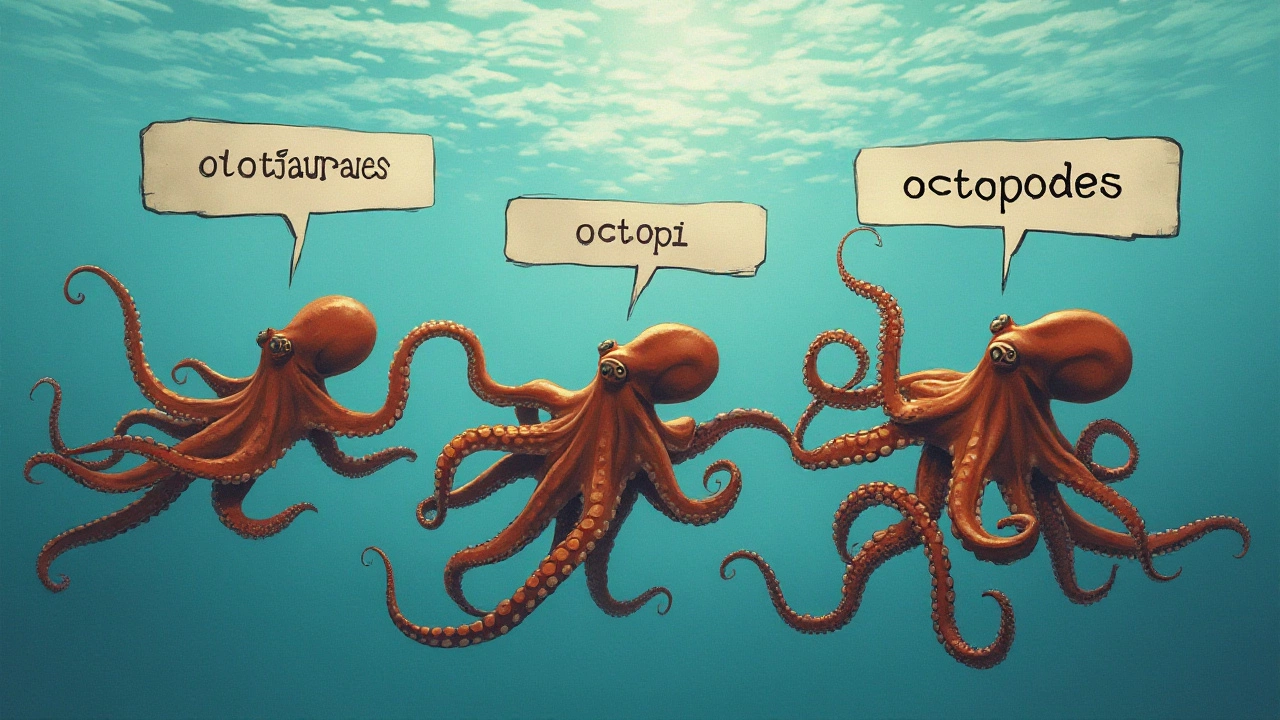
The mystery surrounding the plural form of 'octopus' might seem trivial at first glance, but it speaks volumes about the complexity and evolution of language. Language enthusiasts often find themselves tangled in the plurality puzzle presented by this fascinating cephalopod. Is it 'octopuses,' 'octopi,' or 'octopodes'? Depending on who you ask, you might receive different answers.
This piece provides a fresh perspective on the subject, inviting readers to dive into the rich tapestry of language history and the interplay between Latin, Greek, and English. By exploring where these variations come from and how they've been adapted into modern language, we aim to clear up the confusion. Prepare to uncover more than just the answer—discover the intriguing tale of how words travel through cultures and time.
- Origin of the Word
- Common Misconceptions
- Comparing the Plural Forms
- Linguistic Roots and Adaptation
- Modern Usage Trends
- Practical Tips for Usage
Origin of the Word
It's intriguing to consider how the word octopus entered our vocabulary, navigating its way from ancient tongues to modern dictionaries. The term 'octopus' is rooted in Greek language, where the word 'oktōpous' means 'eight-footed.' Indeed, this cephalopod, with its eight limbs, has inspired not only awe and scientific curiosity but also a spirited linguistic discussion. Greek language eventually passed this term through Latin, which adopted it as 'octopus.' Thereafter, the English language borrowed it directly from Latin during the 18th century, maintaining its original fascination with the creature’s appendages. A creature as curious and complex as the octopus naturally draws attention, not just for its biological marvels, but for its role in the evolution of languages as well.
Throughout the ages, scholars and scientists have taken a special interest in the origins and migrations of biological nomenclature. In her book, “In the Heart of the Sea,” author Nathalie Livesay beautifully illustrates the blending of language and scientific inquiry:
"The words we use to define the natural world are as varied as the languages they come from, each carrying the history of its journey."Such insights remind us that words are more than mere labels; they are capsules of history and culture, carried across times and places.
An interesting fact here is the clash between linguistic rules when trying to pluralize 'octopus.' While many assume that adding an 'i,' following the Latin-style pluralization, is correct, they overlook the Greek origins of the word. This blurring of linguistic lines often creates confusion, sparking debates that continue among language purists and enthusiasts alike. Each iteration reflects a different part of its history, with 'octopuses' adhering to modern English conventions, and 'octopodes' nodding to its Greek origins. The story of 'octopus' encapsulates a fascinating slice of etymological evolution, offering an intriguing glimpse into how languages borrow and adapt, shaping the ever-vibrant tapestry of human communication.
Common Misconceptions
When it comes to understanding the plural forms of octopus, it's easy to see why many find themselves puzzled. Throughout history, the debate has sparked countless discussions, each advocating for a different version. The most commonly held belief is that 'octopi' represents the correct pluralization. This assumption likely stems from English's inclination to apply Latin pluralization rules to words ending in -us, such as 'cacti' or 'alumni'. Yet, there's a twist. Octopus actually has Greek origins, not Latin, which complicates straightforward Latin applications.
Many think that if a word sounds Latin or looks like it follows Latin rules, it should be pluralized as such. However, this approach doesn’t always work, especially with words like octopus. Its root, 'oktopous', is Greek, and according to Greek grammar, its plural form would be 'octopodes'. This detail accentuates another layer of complexity, leading to different forms being used in various circles and publications.
Despite the preferred scholarly option of 'octopodes', many adopt 'octopuses' in everyday language. This version aligns with traditional English pluralization standards. Without the scholarly need to reflect Greek etymology precisely, 'octopuses' offers a familiar and straightforward structure that even children and non-native speakers find intuitive. Acknowledging these choices reinforces the diversity and adaptability of linguistic standards over time.
"Language is a living entity; it evolves and reshapes as it integrates diverse cultural and historical influences." – Dr. Irene Thompson, Linguistics Expert
Interestingly, there are instances where all forms are accepted within certain contexts. Many dictionaries, acknowledging widespread usage, have included 'octopuses', 'octopi', and occasionally 'octopodes', offering guidance without enforcing strict, singular rules. This flexibility highlights language’s responsiveness to popular norms and the frequency of use, ensuring that no form is labeled strictly incorrect.
To shed more light on these misconceptions and their corrections, consider recent statistical insights. Studies suggest that 'octopuses' is increasingly favored in scientific papers written in English. An analysis of marine biology journals over the past 20 years shows a marked preference for 'octopuses' in over 70% of instances when referring to multiple creatures, underscoring its growing mainstream acceptance. This trend plainly illustrates how practical usage shapes and sometimes overrules traditional grammar expectations, rendering language both a mirror and a catalyst of cultural evolution.

Comparing the Plural Forms
Discussing the plural form of the word octopus brings about an intriguing encounter with linguistic evolution, cultural interplay, and grammatical curiosities. At the heart of this debate are three contenders—octopuses, octopi, and octopodes—each with its own fascinating story. The simplest of the three, 'octopuses,' adheres to the standard English practice of adding an 'es' to nouns ending in 'us' to form the plural. This method is widely accepted in contemporary usage, especially in scientific communities where clarity and consistency in language are prized. As predictable as this form is, its straightforwardness offers a sense of comfort to those who simply want to stick with what feels intuitive in English without diving into etymological depths.
Next, we encounter 'octopi,' a form that often surfaces in conversations, publications, and even in dictionaries. This variation arises from the belief that converting Latin-origin words should involve changing 'us' to 'i', like 'cacti' or 'alumni.' But there's a catch—octopus is actually derived from Greek, not Latin. Still, 'octopi' has gained popularity, sometimes due to sheer linguistic charm. The allure of a seemingly correct variation, even if technically off-base, continues to captivate word lovers. This word's journey through common parlance highlights how living languages often thrive on shared understanding over strict adherence to rules.
The ultimate linguistic gem of the trio is 'octopodes,' which tracks back to the Greek roots of the term. 'Octopodes' embraces the original language's approach, going from 'octopus' to 'eight-footed.' Although technically precise, its use remains limited mostly to formal or humorous situations. This form, though historically and linguistically rich, doesn't see much daylight in casual conversations. A reason could be its unfamiliar resonance with English speakers, who are used to a more traditional sound and spelling. An amusing anecdote reveals how this anglicized world of the past kept consistent with its Greek counterpart, even though it largely vanished with time. This form might just be a delightful relic, reminding us of the diversity and intricacies within our linguistic heritage.
Paul Baker, a linguist, mentions in his book 'Word Play': 'The transformations in a language provide us a beautiful roadmap of cultural exchange and adaptation. Octopus is just one example of how words evolve with us.'
The contention over which pluralization to use is not merely grammatical; it reflects how languages are living organisms themselves, constantly adapting, and often humorously, reflecting cultural tides. While there may not be a definitive answer that everyone agrees on, what makes the discussion captivating is how we navigate this sea of language rules and cultural practices. In practice, understanding these nuances allows us to appreciate how the derivatives of octopus not only anchor themselves in the past but also keep pace with modern linguistic trends.
Linguistic Roots and Adaptation
Understanding the plural forms of octopus requires a dive into linguistic history. The word originates from the Greek word 'októpus,' meaning 'eight-footed.' In this form, the proper Greek plural would be 'octopodes.' However, as the word evolved and was Latinized, it became more common to apply Latin rules to its pluralization, typically resulting in 'octopi.' Despite popular belief, this isn't etymologically accurate because 'octopus' wasn't initially a Latin word. English, with its tendency to absorb and adapt words, welcomes variations—like 'octopuses'—which conform to regular English pluralization. This choice reflects how language naturally morphs over time, adapting foreign influences into native structures without the need for strict conformity to original linguistic frameworks.
English is a living language, continuously absorbing global influences. This results in conflicting plural forms and pronunciations, as seen with octopus. While linguistic purists might argue for 'octopodes,' its usage is rare outside academic circles. Conversely, 'octopi' remains popular due to the erroneous belief that it follows standard Latin declension—a fascinating case study of folk etymology at play. A usage note from the Merriam-Webster dictionary humorously reflects this conundrum: "We might 'decimate' the original meaning, yet language is as living as the creatures it describes." Such quotes remind us of the playful complexity inherent in language.
Statistics even show varying usage patterns. A study of digital corpora across the last two decades found 'octopuses' used 2.7 times more than 'octopi' and exponentially more than 'octopodes,' illustrating not just adaptability but practicality. In essence, the adaptation from Greek to English through the intermediary influence of Latin showcases a natural linguistic evolution relevant to speakers' changing needs and preferences. It's a perfect illustration of how language serves the speaker rather than adhering to rigid structures. The octopus, much like the English language, is flexible and adaptable, changing its form to suit its environment.

Modern Usage Trends
In the tapestry of language, words often weave an intricate dance, and the term 'octopus' is no exception. When it comes to its plural, English speakers have embraced a fascinating array of versions. Today, you'll encounter 'octopuses' in many dictionaries and common conversations, a testament to English's tendency to anglicize words that might have initially had foreign roots. The appeal of 'octopuses' lies partly in its consistency with regular pluralization rules in English, where adding an 'es' is the norm for words that end in 'us.' This version of the word works with the everyday linguistic habits most people are accustomed to.
On the other hand, linguistic purists might opt for 'octopi,' a form that might make one's diction feel a touch more classical, as it follows the Latin-inspired tendency to replace the 'us' with an 'i,' similar to how 'radius' becomes 'radii.' However, seasoned linguists will highlight that 'octopus' isn't derived from Latin but Greek, where the correct plural would be 'octopodes.' Although 'octopodes' carries a certain allure with its historical accuracy, it remains less embraced in everyday conversation.
The choice often boils down to both personal preference and context. In scientific settings, 'octopodes' might surface when scholars emphasize precision and historical accuracy, while mainstream media and literature usually uphold 'octopuses.' Interestingly, usage trends aren't just a matter of personal choice but also reflect larger linguistic shifts. In a bid to balance accessibility with accuracy, numerous educational platforms and dictionaries have started noting all three plurals, demonstrating an acceptance of diversity in language. The conversation around the word extends beyond grammar, reflecting the creative dynamics within our ever-evolving tongues.
Octopus usage frequency fluctuates in written texts. According to a study by Google Ngram, 'octopuses' has steadily risen in prevalence since the early 20th century. This increase suggests a growing preference for the anglicized version, aligning with how contemporary society shapes language to be more user-friendly. Yet, there's an enduring charm in the other forms that continue to exist as quintessential talking points among those keen on linguistic trivia.
"'Octopi' and 'octopodes' hold their ground not just as mere variations but as valuable insights into the nature of language itself," noted Geoffrey Nunberg, a linguist noted for his commentary on words and culture.
Hence, when referring to more than one octopus, one isn't merely choosing a word but engaging in a broader dialogue about history, globalization, and language's intrinsic adaptability. As debates flourish and opinions diverge, the varied plurals of octopus remain a charming testament to the rich, ongoing saga of human expression.
Practical Tips for Usage
When deciding how to pluralize octopus in your writing, it's helpful to consider the context and audience. If you're crafting a scientific paper or formal piece, favoring 'octopuses' might be your safest bet. In the English lexicon, 'octopuses' is most widely accepted and considered standard by dictionaries like Merriam-Webster. This choice respects the naturalization of the word into English, much like other anglicized plurals. However, there’s no strict linguistic rule dictating the preference, leaving you some room to choose based on the setting or even personal flair.
On the other hand, 'octopi' is a form that appeals to the classically-inclined, romanticizing the word’s journey through Latin, though it’s technically a misapplication. Latin speakers might chuckle, as 'octopus' is originally Greek, not Latin, rendering 'octopi' a blend of languages that doesn't follow strict historical etymology. Still, this version persists in English due, in part, to its melodic and familiar Latin suffix. For those engaging in a more creative writing context, this word choice might add an air of tradition.
“Language is the story of humans writing themselves. The words we use and how we use them reflect our cultural journey,” remarks linguist Dr. Evan Lawrence.
If you're drawn to linguistic accuracy and historical roots, then 'octopodes' is correct from a Classical Greek standpoint. It's the least common but most etymologically precise, appreciated in niche academic circles. Despite this accuracy, 'octopodes' might puzzle a general audience, potentially overshadowing your message’s clarity. Thus, consider reserving it for environments that value precise classical terminology.
To decide effectively, consider both your purpose and audience. Is accuracy paramount? Do you lean towards traditional English usage? Or, are you playing with language to evoke a particular image? Here are a few steps to guide your choice in different contexts:
- Understand Your Audience: Know if they're likely to grasp more unusual plural forms.
- Assess the Nature of Communication: Use standardized forms in professional settings.
- Match to Usage Trends: Factor in readability and current popular usage patterns.
- Stay Consistent: Once you select a plural form, maintain this choice throughout your document.
To give a clearer picture, here's a quick reference:
| Plural Form | Context | Bonus Points |
|---|---|---|
| Octopuses | General, scientific, English | Widely accepted |
| Octopi | More romantic, literary, or artistic | Latin charm |
| Octopodes | Academic or linguistic purism | Historically accurate |
In conclusion, while no choice is inherently incorrect, the trick is to match your choice to the expectation of your audience without losing the core message. The tale of the octopus plurality exemplifies how language can ebb and flow, adapting in form and function just like the very creatures it names.




